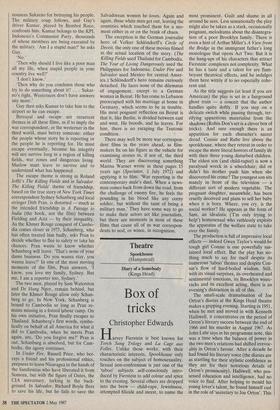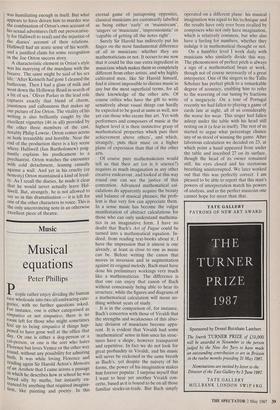Theatre
Spookhouse (Hampstead) Diary of a Somebody (Kings Head)
Box of tricks
Christopher Edwards
Harvey Fierstein is best known for Torch Song Trilogy and La Cage aux Folles. Unlike those works, with their characteristic interests, Spookhouse only touches on the subject of homosexuality. Sexual non-conformism is just one of the `taboo' subjects self-consciously intro- duced by Fierstein to add colour and spice to the evening. Several others are dropped into the brew — child-rape, Jewishness, attempted filicide and incest, to name the most prominent. Guilt and shame in all around he sees. Less sensationally the play might also be taken as a stark, occasionally poignant, melodrama about the disintegra- tion of a poor Brooklyn family. There is even a hint of Arthur Miller's A View from the Bridge in the immigrant father's long monologue that opens Act Two. But it is the hang-ups of his characters that attract Fierstein: complexes not complexity. What he has a taste and a talent for are flam- boyant theatrical effects, and he indulges them here wittily if to no especially cohe- rent end.
As the title suggests (at least if you are American) the play is set in a fairground ghost train — a conceit that the author handles quite deftly. If you step on a delicate switch while passing through, ter- rifying apparitions materialise from the shadows (Robin Don's set is a clever box of tricks). And sure enough there is an apparition for each character's secret dread. Connie and Rube live above the spookhouse, where they retreat in order to escape the more literal horrors of family ife with their three young disturbed children. The eldest son (and child-rapist) is now a paralysed wreck in a wheelchair; did or didn't his mother push him when she discovered his crime? The youngest son sits mutely in front of the television — a different sort of modern vegetable. The pregnant daughter, meanwhile, has been cruelly deceived and plans to sell her baby when it is born. Where, you cry, is the social worker? He appears in the form of Sam, an idealistic (I'm only trying to help') homosexual who ruthlessly exploits the apparatus of the welfare state to take over the family. The production is full of impressive local effects — indeed Gwen Taylor's would-be tough girl Connie is one powerfully sus- tained local effect. But the play has no- thing much to say for itself despite its numerous 'taboo' themes and despite Con- nie's flow of hard-boiled wisdom. Still, with its visual surprises, its overheated and sentimental emotions, its Brooklyn wisec- racks and its excellent acting, there is an evening's distraction in all of this.
The small-scale dramatisation of Joe Orton's diaries at the Kings Head theatre makes a gripping evening. Starting in 1951, when he met and moved in with Kenneth Halliwell, it concentrates on the period of Orton's literary success between the end of 1966 and his murder in August 1967. As John Lahr says in his programme note, this was a time when the balance of power in the two men's relations had shifted irrevoc- ably in Orton's favour. After a decade he had found his literary voice (the diaries are as startling for their stylistic confidence as they are for their notorious details of Orton's promiscuity). Halliwell, who pos- sessed education and intelligence, had no voice to find. After helping to mould his young lover's talent, he found himself cast in the role of 'secretary to Joe Orton'. This was humiliating enough in itself. But what appears to have driven him to murder was the combination of Orton's own account of his sexual adventures (left out provocative- ly for Halliwell to read) and the injustice of the diaries' account of their relations. Halliwell had an acute sense of his worth, and a justified claim for some recognition in the Joe Orton success story.
A characteristic element in Orton's style was his marrying of the mundane with the bizarre. The same might be said of his sex life: 'After Kenneth had gone I cleaned the bathroom. Then I had a glass of milk and went down the Holloway Road in search of a bit of sex.' Oliver Parker in the lead role captures exactly that blend of charm, jauntiness and callousness that makes up our picture of Joe Orton. The vitality of his writing is also brilliantly caught by the excellent vignettes (46 in all) provided by the other three members of the cast, notably Philip Lowrie. Orton comes across as both irresistible and horrible. Near the end of the production there is a key scene where Halliwell (Ian Bartholomew) poig- nantly explains his predicament to a Psychiatrist. Orton watches the encounter with cold detachment, leaning casually against a wall. And yet in his cruelty (or honesty) Orton maintained a kind of loyal- ty. As I recall the diaries, he made it clear that he would never actually leave Hal- liwell. But, strangely, he is not allowed to say so in this dramatisation — it is left for one of the other characters to voice. This is the only unconvincing note in an otherwise excellent piece of theatre.



















































 Previous page
Previous page